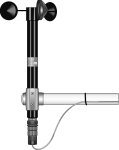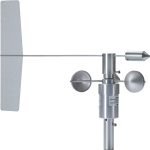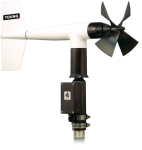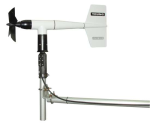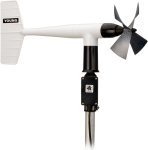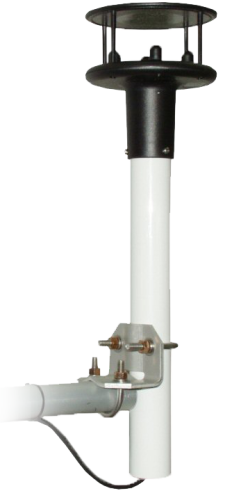






Überblick
Das Windsonic4 ist ein zweidimensionales Ultraschall-Anemometer zur Messung von Windgeschwindigkeit und -richtung. Es bietet eine alternative zu traditionellen mechanischen Windsensoren und hat keine beweglichen Teile. Es gibt ein SDI12-Signal aus, das direkt mit einem CR200(X), CR800, CR850, CR1000 oder CR3000 und auch einigen älteren Datenloggern ausgelesen werden kann.
Für Gegenden mit viel Schnee oder Eisbildung ist der Windsonic nicht geeignet, da er keine Heizung hat. Auf Anfrage können wir Ihnen gern einen beheizten Windsensor empfehlen.
Bitte beachten: Die angebotenen Halterungen können sich je nach Campbell Vertretung unterscheiden.
Lesen Sie mehrFunktionen und Vorteile
- Low maintenance—no moving parts significantly reduces maintenance cost and time
- Provides a minimum detectable wind speed of 0.01 meters per second
- Compatible with most Campbell Scientific data loggers
Bilder



Zugehörige Produkte
Technische Beschreibung
The WindSonic4 uses two pairs of orthogonally oriented transducers to sense the horizontal wind. The transducers bounce the ultrasonic signal from a hood, thus minimizing the effects of transducer shadowing and flow distortion.
Unlike mechanical anemometers, the WindSonic4 has no moving parts to be periodically replaced—minimizing routine maintenance costs.
Kompatibel mit
Mounting
The WindSonic4 is shipped with the 17387 mounting kit. This mounting kit is used to attach the sensor to a CM202, CM204, or CM206 crossarm. The crossarm is then mounted to a tripod or tower.
Data Logger Considerations
The WindSonic4 is connected to one control port, +12 Vdc, and ground. Up to ten WindSonic4s (each with a unique address) can be connected to one data logger control port.
Programming
The SDI12 instruction is used to collect data from the WindSonic4.
Spezifikationen
| Applications |
|
| Sensor | 2-dimensional ultrasonic anemometer |
| Measurement Description | Wind speed and direction |
| Operating Humidity Range | < 5% to 100% RH |
| Operating Temperature Range | -35° to +70°C |
| Storage Temperature Range | -40° to +80°C (typical) |
| Input Voltage | 9 to 30 Vdc |
| Typical Current Drain | < 10 mA (@12 V) |
| Measurement Frequency | 40 Hz block averaged to a 1 Hz output frequency |
| Outputs Parameters | Polar (direction and speed) or orthogonal (Ux and Uy wind) |
| Output Signal | SDI-12 version 1.3 |
| Diameter | 14.2 cm (5.6 in.) |
| Length | 16.0 cm (6.3 in.) |
| Weight | 0.5 kg (1.1 lb) |
Maximum Cable Length |
|
| -NOTE- | For longer cable lengths, contact Campbell Scientific. |
| 1 Sensor Connected to 1 Port | 91.44 m (300 ft) |
| 2 to 10 Sensors Connected to 1 Port | 60.91 m (200 ft) |
Wind Direction |
|
| Range | 0º to 359° (no dead band) |
| Accuracy | ±3° |
| Resolution | 1° |
Wind Speed |
|
| Range | 0 to 60 m/s |
| Accuracy | ±2% (@ 12 m/s) |
| Resolution | 0.01 m/s |
Dokumente
Broschüren Produkte
Technische Artikel
FAQs für
Number of FAQs related to WINDSONIC4: 9
Alle anzeigenWenige anzeigen
-
Yes, as long as these two conditions are met:
- There are no obstructions in the measurement volume.
- The temperature is between -35 to +70 degrees Celsius.
-
The fastest output frequency is 4 Hz for the WindSonic1 and 1 Hz for the WindSonic4.
-
All WindSonics (option 1 or option 4) are shipped from Campbell Scientific with an interface cable. If the cable has been lost, order a replacement. Order model WINDSONIC1CBL-Lxx for an option 1 or WINDSONIC4CBL-Lxx for an option 4, where xx is the cable length. The maximum cable length is 50 feet for option 1. The maximum cable on the SDI-1 bus is 200 feet.
-
There are no user-serviceable parts on the WindSonic1 and WindSonic4. Should the WindSonic require service, it will start setting diagnostic flags. Campbell Scientific recommends that all datalogger programs record the total number of times the flags are set in an output period. For details, see the WindSonic Instruction Manual.
-
The WindSonic is not suitable for measuring the vertical wind component. The WindSonic measures the wind that passes through its measurement volume. It does not care what the orientation is. If the WindSonic is turned on its side, the reflecting top and body of the sensor will cause massive flow distortion of the wind vector, specifically for the horizontal component that is perpendicular to the reflective top. This flow distortion will most likely result in erroneous vertical wind measurements.
-
Most Campbell Scientific sensors are available as an –L, which indicates a user-specified cable length. If a sensor is listed as an –LX model (where “X” is some other character), that sensor’s cable has a user-specified length, but it terminates with a specific connector for a unique system:
- An –LC model has a user-specified cable length for connection to an ET107, CS110, or retired Metdata1.
- An –LQ model has a user-specified cable length for connection to a RAWS-P weather station.
If a sensor does not have an –L or other –LX designation after the main model number, the sensor has a set cable length. The cable length is listed at the end of the Description field in the product’s Ordering information. For example, the 034B-ET model has a description of “Met One Wind Set for ET Station, 67 inch Cable.” Products with a set cable length terminate, as a default, with pigtails.
If a cable terminates with a special connector for a unique system, the end of the model number designates which system. For example, the 034B-ET model designates the sensor as a 034B for an ET107 system.
- –ET models terminate with the connector for an ET107 weather station.
- –ETM models terminate with the connector for an ET107 weather station, but they also include a special system mounting, which is often convenient when purchasing a replacement part.
- –QD models terminate with the connector for a RAWS-F Quick Deployment Station.
- –PW models terminate with the connector for a PWENC or pre-wired system.
-
Not every sensor has different cable termination options. The options available for a particular sensor can be checked by looking in two places in the Ordering information area of the sensor product page:
- Model number
- Cable Termination Options list
If a sensor is offered in an –ET, –ETM, –LC, –LQ, or –QD version, that option’s availability is reflected in the sensor model number. For example, the 034B is offered as the 034B-ET, 034B-ETM, 034B-LC, 034B-LQ, and 034B-QD.
All of the other cable termination options, if available, are listed on the Ordering information area of the sensor product page under “Cable Termination Options.” For example, the 034B-L Wind Set is offered with the –CWS, –PT, and –PW options, as shown in the Ordering information area of the 034B-L product page.
Note: As newer products are added to our inventory, typically, we will list multiple cable termination options under a single sensor model rather than creating multiple model numbers. For example, the HC2S3-L has a –C cable termination option for connecting it to a CS110 instead of offering an HC2S3-LC model.
-
Many Campbell Scientific sensors are available with different cable termination options. These options include the following:
- The –PT (–PT w/Tinned Wires) option is the default option and does not display on the product line as the other options do. The cable terminates in pigtails that connect directly to a datalogger.
- In the –C (–C w/ET/CS110 Connector) option, the cable terminates in a connector that attaches to a CS110 Electric Field Meter or an ET-series weather station.
- In the –CWS (–CWS w/CWS900 Connector) option, the cable terminates in a connector that attaches to a CWS900-series interface. Connection to a CWS900-series interface allows the sensor to be used in a wireless sensor network.
- In the –PW (–PW w/Pre-Wire Connector) option, the cable terminates in a connector that attaches to a prewired enclosure.
- In the –RQ (–RQ w/RAWS Connector) option, the cable terminates in a connector that attaches to a RAWS-P Permanent Remote Automated Weather Station.
Note: The availability of cable termination options varies by sensor. For example, sensors may have none, two, or several options to choose from. If a desired option is not listed for a specific sensor, contact Campbell Scientific for assistance.
-
The fundamental measurement frequency of the WindSonic is 40 Hz (40 measurements per second). These measurements are then averaged to give an output at some slower output frequency. For a WindSonic programmed to produce 1 Hz data, all 40 measurements are averaged. (This is called a block average.) For a WindSonic that is programmed to produce 4 Hz data, each output is the block average of 10 fundamental measurements.
Anwendungsbeispiele
Tropical volcanic islands are biodiversity hotspots where the Critical Zone (CZ) remains poorly studied. In......lesen Sie mehr


